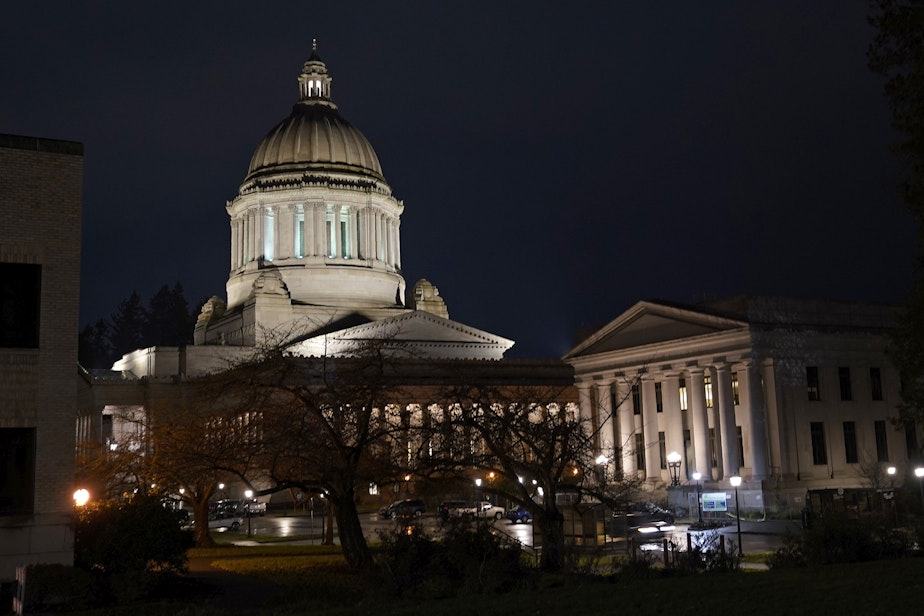No word yet on refunds for people fined under now-void WA drug law

People who paid fines under Washington state’s old felony drug possession law are still waiting for the state to refund their money, which could total tens of millions of dollars. Lawyers representing them are pressing for a statewide process to grant refunds, rather than leaving each county to determine its own response.
Last February in the State of Washington v. Blake decision, the Washington Supreme Court found the state’s longtime drug possession law overly broad and unconstitutional. That ruling meant that people like Adam Kravitz in Vancouver, Washington should be able to clear their records and obtain refunds for the penalties they paid. Kravitz was fined tens of thousands of dollars for a series of drug convictions between 2010 and 2015.
He said during those years he struggled to make minimum payments on his Legal Financial Obligations (or LFOs) to avoid being re-arrested. “I literally had to go in and drop down change – like $5 at a time -- while homeless just to try to keep myself out of warrant status,” Kravitz said. “And that was literally money that I’d begged and bummed off the street.”
But Kravitz was still jailed at least twice for failure to pay his fines.
After 2015, Kravitz completed drug court and became a counselor. He’s currently the executive director of a nonprofit called Outsiders Inn.
He was still making payments on those fines when the Blake ruling came down this year. At that point he called his county clerk’s office and was told he didn’t need to make further payments.
This week Kravitz joined a class-action lawsuit, brought last spring by the Civil Survival Project against Washington State and all of its counties, seeking refunds. Attorney Prachi Dave with the Public Defender Association represents those plaintiffs. She said there’s anecdotal information that counties are no longer collecting fines assessed under the old felony drug possession law. But she said there’s been no systemic effort to cancel remaining debts.
Sponsored
“The cancellation of that debt is really, really important because until that happens, a credit reporting company that doesn’t know about Blake still sees this as an outstanding debt and that continues to impact people,” she said.
Julia Reardon is another plaintiff in the lawsuit. She lives in Everett and said she was 40 years old when she was convicted of a felony drug charge in 2014.
“I was homeless; I had no income,” she said and her court-ordered fines snowballed.
“So I literally went the first few years in and out of jail because I wasn’t making my payments, because I didn’t have any way to pay it," Reardon said. "I really didn’t start paying my LFO’s until I got clean."
She received treatment through a Snohomish County diversion program, and is now a case manager and social services coordinator for Pioneer Human Services.
Reardon said her fines totaled nearly $4,000. According to the complaint, “Over the life of the debt, the interest on Ms. Reardon’s debt reached roughly double the amount of her principal balance. She last paid LFOs to Snohomish County on or about June 2, 2020.”
“I actually had made my last payment just before State versus Blake went through,” Reardon said.
Now that’s the money she’s seeking to get back, in hopes of starting a savings account.
Attorney Prachi Dave said one goal of the lawsuit is to require a comprehensive statewide process to administer the refunds.
“Aside from the fact that it doesn’t make sense to have this be an individualized process, the fact that the different counties have different practices makes it even harder," Dave said.
Sponsored
For Kravitz and Reardon, the refunds are just one part of moving on with their lives in the wake of the Blake ruling. They said it’s crucial for the courts to clear the records of people convicted under the old law, to remove barriers they face to obtaining jobs and housing.
Reardon also paid an attorney to help restore her rights to have a firearm. Kravitz wants to clear his record so he can get a passport and travel.
“Felons are not welcome in Canada,” he said. “We’re in the Pacific Northwest, going to Victoria or Vancouver or places across Puget Sound – it’s a thing we do in the Northwest and it’s been taken from us.”
Seattle attorney Kristin Ballinger is part of the outside law firm representing King and Snohomish counties in the case. She said they had no comment on pending litigation. The Attorney General's office also declined to comment. The lawsuit now includes all 39 counties and the state of Washington as defendants.
Meanwhile, this week the Governor's office outlined steps to help another population affected by the Blake ruling, saying in a press release:
"Washington state has instituted a new process to allow individuals on active community supervision for certain drug possession convictions to directly petition Gov. Jay Inslee to commute their sentences. Inslee is prepared to issue unconditional commutations for eligible petitioners to eliminate any remaining community supervision involving drug possession convictions that have been invalidated by the Washington Supreme Court, as well as any obligation to pay on related legal financial obligations.
There are currently over 1,200 individuals who remain on active DOC community supervision, solely for drug possession convictions held invalid by the Washington State Supreme Court in Blake. These individuals are now eligible to petition for a commutation through this new program."
Sponsored
If you have any feedback on this story, you can email me at aradil@kuow.org or find me on Twitter @AmyRadil. Or you can just click the feedback button on the right hand side of this page.




